
JULIA LEE BARCLAY-MORTON – YOGA, WATER AND REWRITING AUTISM
I interviewed writer Julia Lee Barclay-Morton about her experience of autism. Julia began as an experimental dramatist in New York, moving to the UK to
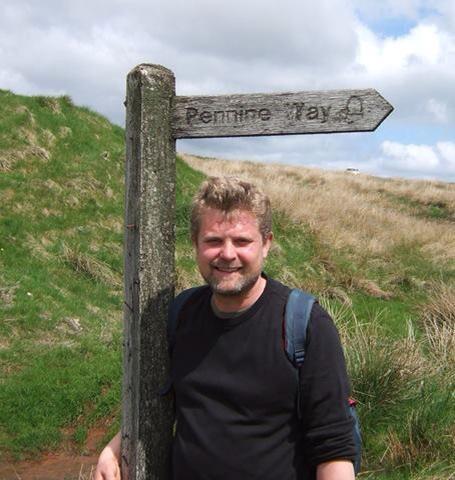
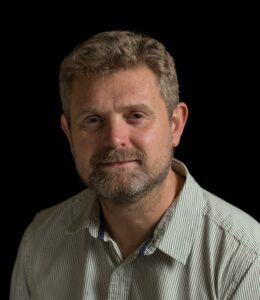
I interviewed poet and artist David Coldwell about Marsden village, a centre for poetry, art, festivals and walking. I asked David to describe the people of Marsden and the cultural organisations he’s involved in including The Poetry Village, Marsden Walkers are Welcome, and Maytree Press.
David says about Marsden: “The reason why we have the Jazz Festival, The Cuckoo Festival, The Poetry Village, Imbolc, The Walking Festival, The Park and many other events and buildings is because people make it happen. “
Leslie: How did Marsden begin, grow and develop as The Poetry Village? What have been the highlights, for you, of this community activity?
David: I first had the idea of Marsden as a Poetry Village in 2014 when I was trying to consolidate a number of ideas and events but struggling to find finance. Marsden is the birth place and childhood home of our Poet Laureate, Simon Armitage, and in addition is now home to many other fine writers, creatives and Write Out Loud.
Write Out Loud already had a monthly community poetry night that was a wonderful opportunity for nurturing talent, but I wanted to see if there was a wider appetite for poetry. It’s such an undervalued artform, so while new voices and spoken word performers such as Kate Tempest are breaking down some barriers, my frustration continues every time I enter a bookshop and see the few classics tucked away in some dark corner.
With limited funds, one of the very early projects was the printing of my own poems on postcards and leaving these in the pubs and the library for people to take freely. Naively I believed that they would be ignored and left in piles littering the place but within a week all the cards had disappeared and people were beginning to approach me and talk poetry.
One of these conversations was with Mark Kelly who runs the outdoor blog, Halfway Hike. Mark and I discussed the possibility of a Poetry Trail, linking some of the poems set around the village into a ten-mile hike. At the time it was just a conversation but to my amazement, within a week, Mark had the first draft and we were out on the hills. The trail continues to be enjoyed, and again, to involve families and younger people, I’ve spent time geo-caching each of the poems, leaving printed versions in secret locations.
The next project, and one I am most proud of, was The Poetry Shelves. I initially thought that I could get a few second-hand poetry books and place these in a pub, but after writing several letters to poetry publishers around the country I suddenly began to receive boxes of donations. I was eventually able to create six shelves in total, three in pubs and three in cafes and we launched the shelves in a grand tour of the pubs with around forty people who had not been to a poetry reading previously joining us.
The Poetry Village, which is an on-line place for poems, developed out of these projects. It has grown and changed over the last year and, thanks to our supporters and volunteers, we’ve been able to contribute to community events as well as publish some of the best new poetry around.
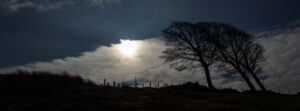
Leslie: You’re part of Marsden Walkers are Welcome. What’s special about walking in the area?
David: I’ve worked alongside the Marsden Walkers are Welcome steering group as a volunteer for the last couple of years which has been great fun. Marsden sits at the top of the Colne Valley and is surrounded on three sides by open moorland. In total there are sixty-three miles of public footpaths together with open access so it’s safe to say that it’s a very special place to be able to get out and access the countryside. The moorland is managed by the National Trust and has become an area of special scientific interest.
What many people don’t realise is that Marsden Walkers are Welcome is a purely volunteer group and receives no mainstream funding yet with some imaginative initiatives we’ve managed to publish a number of walks as well as launching the first ever Marsden Walking Festival. As well as the moorland, Marsden village is a fascinating place and has been used as the setting for a number of television and, more recently Hollywood films. I’ve been collecting memories of these filming events for some years so was delighted to have the opportunity to finally publish the Marsden Film and Television trail which can be downloaded from the Marsden Walkers are Welcome website.
Leslie: Could describe a few people, please, who have been important to Marsden and yourself? What has been their contribution?
David: If I was to name Duncan then everyone in Marsden would know exactly who I talking about. Duncan has been cutting hair in the village for 54 years and, at the age of seventy, has just retired. I would describe Duncan as Marsden Glue – the type of person who holds the community together. As well as cutting hair, Duncan used to take us junior football training (always making sure our fringes were short), has played in many bands, provides PA services for community groups (happy to be paid in pies) and has sold tickets for the community shows from his barbers shop that still had the 1970’s styling up to closing its doors at the end of May. Duncan leaves a huge gap in the village and I can honestly say that I was genuinely saddened when he tapped me on the shoulder saying, very matter-of-factly, ‘Well, that’ll be the last one’.
Like Duncan, Simon Armitage is also a Marsdener (albeit, former) who you can now refer to in public by forename only. Once known as Peter’s lad, I’d just returned to Marsden following a stint in the media industry when Simon first published Zoom. Being a poetry reader (mainly Frost at the time), I was blown away by the language and the fact that a Marsdener had published such an amazing collection. I quickly began to promote the book to anyone who would listen and still smile to myself now when thinking about those English Literature teachers at night class who had not heard of Simon Armitage. One suggested I should choose something more appropriate to discuss!
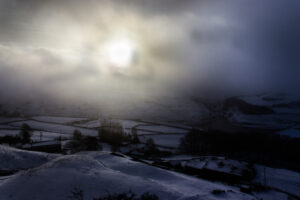
Leslie: What has been the year-round impact of the arts on Marsden as a community?
David: Marsden remains very laid back in its approach to celebrating the rich cultural diversity of the village and surrounding areas. Other than the art gallery, it’s unlikely that you’ll find any of the other shops open on a Sunday so visitors who haven’t ventured to the hills can be left a little wanting. Each October sees Marsden play host to an internationally acclaimed Jazz Festival, yet you’ll be hard pressed to find any mention of it throughout the rest of the year. The BAFTA award winning animation company, Fettle Animation is based in the village, as is the award winning Mikron Theatre Company, but again, no one really mentions any of this. Built on the textile industry, in many ways, Marsden is held to ransom by mill-owning families who sit on the huge empty mills waiting for them simply to rot and fall. Whilst other areas, such as Hebden Bridge and, more latterly, Slaithwaite, have been able to exploit the arts industry, Marsden’s lack of affordable studio and gallery space has stifled any regeneration despite the availability of these mills. Why or how the local authority allows this to happen is beyond many people and whilst rumours surface every couple of years, the mills remain empty and silent, dictating the landscape but no longer adding anything to the community.
Leslie: What are your poetry and personal European connections?
David: The Poetry Village has proudly published some amazing work from across the globe. We publish in English but where we have received a translated poem I’ve also published the original version alongside. It’s wonderful to see poems having a whole new life across the internet and I’m always amazed by the diversity of readership.
My Grandfather was from Latvia and moved to the UK during the war to work in the textile industry. Whilst we were never close, I’ve always felt an affinity to that part of the world and my regrets are that I didn’t find out more about the life he left behind. His English was poor and he had a strong accent, which made communication very difficult, especially when added to his partial deafness as a result of childhood glue ear. My speech had also suffered due to my deafness which also created barriers with communication. I was still attending speech therapy until the age of ten, by which time you’ve kind of lost the ability to form those grandfather/grandson type relationships.
Being keen on property renovating and having a secret longing for the Mediterranean means I’m a huge fan of what I would categorise as the ‘Good Life’ authors. These are the folks who have upped sticks and moved to sunnier climes, funding their travels with autobiographies. My favourite has to be Chris Stewart who wrote the Lemon Trilogy and in 2010 I was lucky enough to be able to travel to his farm in Andalucia and meet with him. He’s a great chap and we passed the time of day discussing the previous winter’s storms and cloud formations before he had to dash off in his white Landrover down the track to Orgiva. I’ve long had the spark of an idea for a travel documentary where the interpret reporter tracks down these various authors to discover the truth behind the books. Chris would be an excellent start.
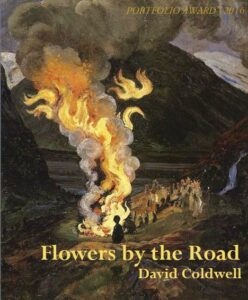
Leslie: Can you describe, please, your own creative projects.
David: I suppose the best way to describe my own creative projects at present is chaotic. We have just launched the publishing company, Maytree Press, a poetry press specialising in producing beautiful poetry pamphlets and anthologies. Part of the process is to combine poetry with art and produce unique covers featuring original paintings. Whilst we’ve teamed up with a number of artists who are producing work, my own paintings are currently featuring. We’ve deliberately set out to create quality products and our first three pamphlets featuring work by Hannah Stone, Maria Isakova Bennett and Tim Taylor are already getting favourable reviews.
I am also about to start the work on the libretto for a new opera by composer, Nino Russell scheduled for release next year. Hopefully we will also be able to publish this as an illustrated book alongside a new poetry pamphlet that I’m currently completing focusing on mental health and wellbeing.
Leslie: What other aspects of Marsden and the area have played an important or formative role in your life?
David: Marsden is a unique place and you really have to live here to fully understand the different aspects of the community and what makes the village special. The reason why we have the Jazz Festival, The Cuckoo Festival, The Poetry Village, Imbolc, The Walking Festival, The Park and many other events and buildings is because people make it happen. Marsden could have quite easily become a Commuter Satellite for the cities of Leeds and Manchester but instead it has held on to its vibrancy and community spirit where people make things happen.
Leslie: What have you learned about yourself and other people from your involvement in walking, poetry and art around Marsden?
David: People who know me understand that I have a difficult job within the public sector and poetry, art and walking provide the perfect antidote to this and help create a work/life balance and provide some perspective. I’m a great believer in the ‘Stress Bucket’ model and my creative and community exploits are simply added holes in the bucket.
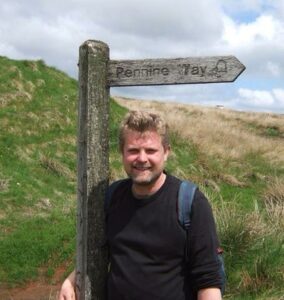
I look to learn something every day whether that something is about myself, about something or simply a fact. I have a curious active mind and can rarely concentrate long enough due to ideas or questions that need answers.
The most important thing that I’ve learnt is just to appreciate how lucky I am. I have a wonderful family, healthy children, live in a great place and am fortunate to know some amazing people and despite the grey clouds, cold winds and sometimes horizontal rain, it’s worth remembering that there is always some blue sky somewhere.
Next week I talk to film maker Nicolette Burford about her documentary tracing the remarkable life of Ada Salter – environmentalist, peace activist, and first woman councillor in London.
ABOUT LESLIE TATE’S BOOKS:

I interviewed writer Julia Lee Barclay-Morton about her experience of autism. Julia began as an experimental dramatist in New York, moving to the UK to

I interviewed Gillean McDougall from Glasgow, who edited the collaborative projects Honest Error (on Charles Rennie Mackintosh and his wife Margaret Macdonald) and Writing the

I interviewed French writer Delphine de Vigan, whose book, No et moi, won the prestigious Prix des libraires. Other books of hers have won a clutch

I interviewed Joanne Limburg whose poetry collection Feminismo was shortlisted for the Forward Prize for Best First Collection; another collection, Paraphernalia, was a Poetry Book Society Recommendation. Joanne

I interviewed Katherine Magnoli about The Adventures of KatGirl, her book about a wheelchair heroine, and Katherine’s journey from low self-esteem into authorial/radio success and
| Cookie | Duration | Description |
|---|---|---|
| cookielawinfo-checkbox-analytics | 11 months | This cookie is set by GDPR Cookie Consent plugin. The cookie is used to store the user consent for the cookies in the category "Analytics". |
| cookielawinfo-checkbox-functional | 11 months | The cookie is set by GDPR cookie consent to record the user consent for the cookies in the category "Functional". |
| cookielawinfo-checkbox-necessary | 11 months | This cookie is set by GDPR Cookie Consent plugin. The cookies is used to store the user consent for the cookies in the category "Necessary". |
| cookielawinfo-checkbox-others | 11 months | This cookie is set by GDPR Cookie Consent plugin. The cookie is used to store the user consent for the cookies in the category "Other. |
| cookielawinfo-checkbox-performance | 11 months | This cookie is set by GDPR Cookie Consent plugin. The cookie is used to store the user consent for the cookies in the category "Performance". |
| viewed_cookie_policy | 11 months | The cookie is set by the GDPR Cookie Consent plugin and is used to store whether or not user has consented to the use of cookies. It does not store any personal data. |
8 responses
Great interview. Enjoyed. Thanks.
🙂 🙂 🙂
An interesting interview. The Colne Valley seems to be bursting with artists and creators!
Yes, it seems like they might have found an answer to the perennial problem of getting people out of their houses to meet up and socialise. 🙂 🙂 🙂
Wow, I didn’t realise that you did so many things David. I love some of the initiatives that you have pioneered in your home town. I’m particularly interested in the cuckoo festival. I have written about cuckoos, they’re called Koring Chiriclos in the Romani language. Kushti Bokt for future projects.
Thanks, Raine, that’s a really interesting addition. I think we have a piece by you planned but we haven’t fixed the date and content yet? I’m keen to have you back in 2020!
This is a great interview, Leslie. David has certainly done great things in his town when it comes to poetry, and that makes me feel very happy.
Yes, David’s one of those super-active people… A bit like you, really!